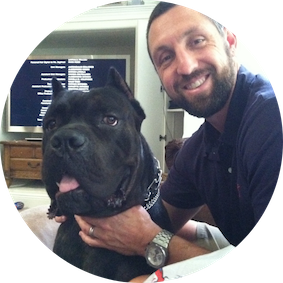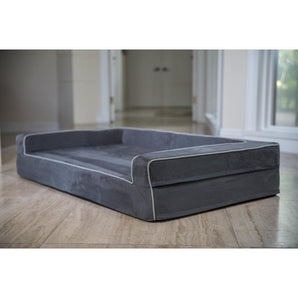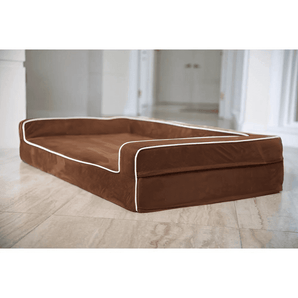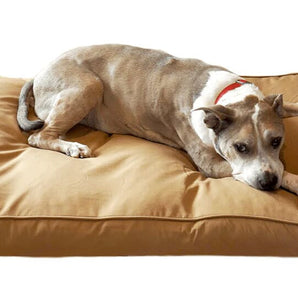Think about your dog. What’s he or she doing at this exact moment? If I had to take a guess, your dog is snuggling up on the couch or is laying out on its bed taking a snooze right where you left them.
Sleep is an everyday staple of a dog’s daily routine, no matter the size, age or breed. And according to the National Sleep Foundation, sleep can sometimes take up over half of your dog’s day. But how do you know how much sleep is too much? Or not enough?

I’m here to help guide you through this common question among dog owners and provide you general guidelines for how much sleep your dog should be getting each day.
One important thing to understand before we dive into the different variables that affect how much sleep your dog needs is that dogs do not sleep exactly like we do – they are much more adaptable when it comes to their sleep schedule and only reach the REM stage for about 10 percent of their sleep cycle compared to 25 percent in humans.
(The REM stage is vital in any sleep cycle – dog or human – because it stimulates the areas in the brain that are associated with learning.)
Because of this, dogs need more hours of sleep a day to properly rest and recharge their bodies. For the other half of the day they’re not getting some shuteye, they’re either lying around awake or should be getting a healthy amount of physical activity.
There are many contributing factors that impact how many hours of sleep your dog should be getting per day, such as age, breed, size, health, activity levels and more. While each element is important (I’ll touch on all of those in this article), the age of your dog should be the starting point when determining how much sleep is necessary.
Let’s begin by understanding the range in sleep from puppies to full-grown adults to seniors.
How much sleep do puppies need?
You just brought your puppy home for the first time. One of the first things you may be wanting it to do (other than going to the bathroom outside and not on your carpet) is to find a spot where they can feel safe and comfortable. Where they can wind down and get a good night’s sleep after keeping you busy all day.
Because they have so much energy and are constantly exploring their new environment, puppies will typically need 18-20 hours of sleep per day to accommodate their rambunctious lifestyle.
It’s important to note that since your pup will only be up for roughly 4-6 hours during a 24-hour period, you’ll need to make the most of the time your pup is awake to assure it gets properly trained and socialized.
Getting the right amount of sleep is especially essential for puppies because an inadequate amount can lead to health problems and behavioral issues down the road.
As puppies grow older, the amount of sleep needed will slightly decrease. Their physical transformation and cognitive changes will allow them to spend more of their day being active and engaged.
Once a puppy has matured into a full-grown adult, you’ll want to reassess how much sleep it needs on a daily basis.
How much sleep do adult dogs need?
Puppies are generally considered to become adults at 1 or 2 years old. However, this will vary from dog to dog based on a number of different factors.
If you’re having trouble distinguishing when your puppy has transitioned out of the puppy phase and into adulthood, three key things to look for are your dog’s diet, its physical maturity and its emotional maturity.

Usually considered to be anywhere from 1-2 to 8-10 years old, an adult dog needs about 12-14 hours of sleep per day. Their bodies will be bigger and produce more energy than when they were younger, therefore requiring more exercise and a lot of rest.
Getting enough physical activity and sleep is just as important for dogs in adulthood as it is in the puppy stage. As I’ll touch on later, the activity level in each dog will differ and will result in a dog requiring more or less sleep because of it.
The bottom line for adult dogs is to make sure you pay close attention to how much exercise they’re getting while also balancing a healthy sleep schedule.
How much sleep do senior dogs need?
When dogs begin to roll into their senior years, their activity levels will decrease while their need for sleep will increase. Though old age is enough of a cause itself, dogs could be experiencing multiple different symptoms, including joint pain or weight gain that require them to get more sleep.
Senior dogs should typically be getting anywhere from 14-20 hours of sleep. They will tire out much easier than when they were an adult or puppy and will need more sleep to nourish their bodies so they can continue functioning properly.
As stated earlier, the age of the dog is only one of many contributing factors that affect how much sleep your dog should be getting each day. But beginning with the age of your dog is a good starting point to pinpoint a definitive range for how much sleep is needed.
Once you have a ballpark range of hours based on your dog’s age, you can narrow that range down even more when factoring in other elements of its lifestyle.
What role does breed and size play in a dog’s sleep?
Another factor to consider when monitoring how much sleep your dog should be getting is its breed and size.
While both breed and size can go hand-in-hand, a dog’s breed will give you a better idea of the amount of snooze time it should get. The size of the dog is not necessarily a huge determining factor, although many large dog breeds have earned the popular nickname of “mat dogs.”
Some well-known dog breeds that tend to hit the snooze button for longer than their companions are the Saint Bernard, Pug, Great Dane, Cocker Spaniel and the Shih Tzu. If you have one of the breeds listed here, it’d be smart to aim for the high end of hours for their sleep schedule.
No matter what kind of dog you have, however, I’d recommend doing some research on their breed to understand if they are generally more laid back or require lots of physical activity. This will give you a better idea of how much sleep they should get on a daily basis.
What role does activity level play in a dog’s sleep?
Activity level is another important element to consider when monitoring your dog’s sleep. While it may seem straightforward that dogs who are very active need more sleep and dogs who are less active need less sleep, that is not always the case.
Dogs that require lots of physical activity, especially working dogs, don’t necessarily need more sleep. Because they spend more of their day completing tasks or exhausting their energy doing other things, they will sacrifice some of their sleep – (which is perfectly OK, their bodies can still function properly on less sleep.)
On the flip side, dogs that are less active and more leisurely can actually require more sleep because it takes their bodies a bit longer to recuperate and gain back any energy they used during the day, no matter how minimal that may be.
Regardless of your dog’s activity level, it’s still going to spend a good chunk of the day sleeping. There’s no need to worry if you have an extremely playful dog that seems to sleep less than your neighbor’s lethargic dog.
The bottom line is because every dog has different needs for physical activity, every dog will also have different needs for their sleep cycle.
When to be concerned about your dog’s sleep
While dogs’ sleeping habits can be adaptable and will change over time, you shouldn’t become concerned unless there is a dramatic increase or decrease in the hours of sleep they’re getting throughout each day.
If your pup is very active and is getting roughly 18 hours of sleep per day, but is suddenly sleeping for just 10 hours a day, it’d be smart to contact your veterinarian as dramatic changes in a dog’s sleep cycle can be due to looming health problems.
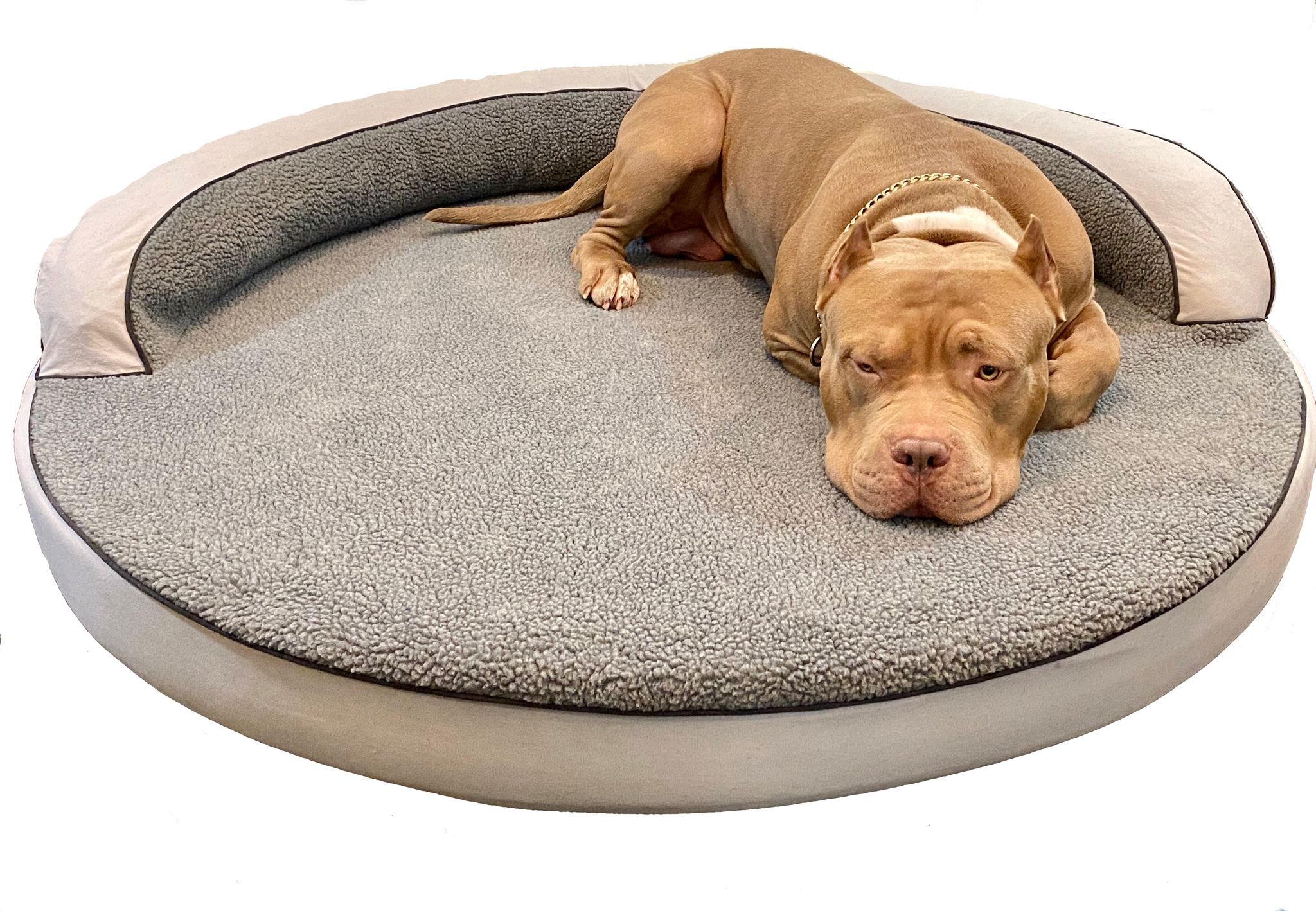
These health issues can include thyroid issues, separation anxiety, or breathing problems, among others.
Potential causes that could lead to a drastic change in sleep or possible health issues within your dog are a change in routine, lack of food or water, depression, or hypothyroidism.
When you first sense a major change in your dog’s sleeping pattern, always contact your vet as soon as possible. The solution could be as easy as adding to your dog’s diet or complicated as treating a heart condition.
How to improve your dog’s sleep
From keeping them in a structured routine to playing music at a low volume or giving them a bed of their own, there are multiple solutions to help improve your dog’s sleep without prescribing them a sleeping pill.
One of the most valuable things a dog can have to help it sleep better at night is its very own bed. Some dogs may prefer to snuggle next to their owner on the bed, but dogs that have their own exclusive spot in the house provides a sense of security and comfort that cannot be produced elsewhere.
Dog beds that are made of non-hazardous foam and hypoallergenic materials are perfect for dogs of any kind and especially dogs who are large, aging, or arthritic.
If your dog sleeps in a crate, a chew-resistant crate pad that has over two inches of orthopedic foam and is free of all the dangerous materials will make your dog feel right at home.
When looking around for a bed, pad, or blanket for you dog, be sure that you know what materials are and aren’t being used so you can have your dog’s best interest in mind when it comes to safety and comfort.
Conclusion
There are lots of factors that affect how much sleep a dog needs. The first step is to identify is your dog’s age and then incorporate other factors such as size, breed, activity level and health to determine how much sleep is the right amount of sleep.
Typically, puppies will need 18-20 hours of sleep per day. Adult dogs, ranging from 1-2 to 8-10 years old, should get about 12-14 hours of sleep per day. Senior dogs will need anywhere from 14-20 hours of sleep per day.
You should become concerned about your dog’s sleeping habits if there is a dramatic change in the amount of sleep they’re getting each day. A big change in sleep patterns could be caused by a number of health issues and you’ll need contact your veterinarian as soon as possible.
Finally, to help improve your dog’s sleep without having to be prescribed any medication, a dog should have their own bed or spot in the house where they can feel safe and secure. I recommend the Original Orthopedic Bully Bed.
What are you tips or tricks for helping your dog sleep better?
